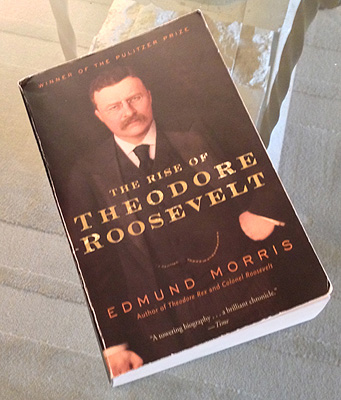Book Review: The Rise of Theodore Roosevelt

The Rise of Theodore Roosevelt by Edmund Morris
This mountain of a biography chronicles the life of Theodore Roosevelt before he became president at the age of 42. It is inspiring, insightful, and exceedingly well documented (over 100 pages of notes).
TR was noted for his integrity, personality, and masculinity. He was a highly energetic person who never seemed to let a moment rest without doing something productive. As a child he spent his time reading and ripping apart animals to study their insides. As a youth he studied foreign languages, exercised for hours a day, and ripped even more animals apart. As a young adult he attended Harvard, hunted Buffalo in the Dakotas, bought a ranch, wrote several books, served as New York assemblyman, served as the national Civil Service Commissioner, served as a New York City police commissioner, served as Assistant Secretary of the Navy, became Colonel in the Army and led the Rough Riders to victory in Santiago, Cuba, became Governor of New York, and was elected Vice President of the United States just before President McKinley was assassinated.
Reading this book made me want to get off the couch.
In politics, I like how TR evolved into a progressive reformer, while staying true to his Republican party. God knows no one fitting that description exists today.
TR’s energy to make the most out of every minute is probably what I will take away most from this remarkable biography. Whenever I’m feeling unmotivated, I just think of TR and start moving forward.
Roosevelt, ever the schismatic, began to write Thomas Hart Benton. He completed Chapter 1 on 27 March, by which time the boat, a flat-bottomed scow, was ready. But a furious blizzard delayed their departure for three more days. Roosevelt soothed his impatience with a literary letter to Cabot Lodge. “I have got some good ideas in the first chapter, but I am not sure they are worked up rightly; my style is rough, and I do not like a certain lack of sequitur that I do not seem able to get rid of.” Casually mentioning that he was about to start downriver “after some horse thieves,” he added, “I shall take Matthew Arnold along.” He also took Tolstoy’s Anna Karenina, and a camera to record his capture of the thieves. Already he was thinking what a good illustrated article this would make for Century magazine.
Roosevelt’s determination is another quality that I strongly admire. When he put his mind to something, he never let up come hell or high water. He would sooner loose his own life than see events unfold he thought were unjust.
Politically he was extremely well-educated, mostly from being self-taught, and he was never off-put to speak his mind.
That night a highly excited Theodore Roosevelt accosted Mark Hanna and two other Senators at a reception. In his haste to urge war upon them, he did not notice that Hanna was accompanied by Henriette Adler, a young Frenchwoman recently arrived from Paris. Roosevelt launched into a typical fist-smacking harangue, and Mlle. Adler found herself wedged between him and the wall. She tried to follow what he was saying, but was distracted by his flailing right arm, which swept nearer and nearer her bodice. Eventually his elbow ripped off a silken rose and some gauze, whereupon she exclaimed “Mon Dieu.” Roosevelt, wheeling, made profuse pardons. To her alarm, he continued to pour out war rhetoric upon her in French, until Nannie Lodge tactfully appeared with a safety pin. The Senators screened Mlle. Adler off, while Roosevelt switched back to English.
An incredible man covered by an incredible author.
